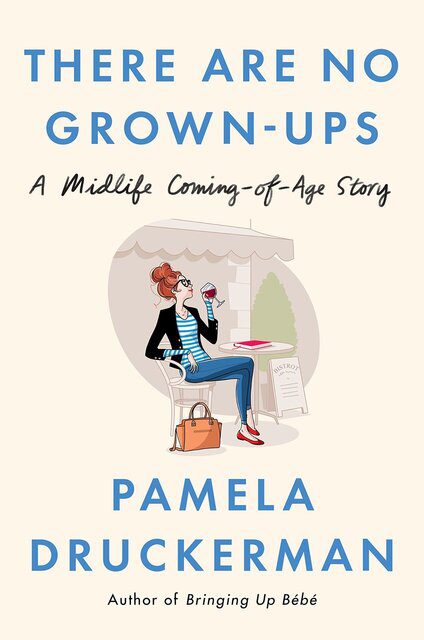There are no grown-ups. Everyone is winging it; some just do it more confidently.
Part frank memoir, part hilarious investigation of daily life, In There Are No Grown-Ups, author and New York Times contributor Pamela Druckerman writes about midlife, the quest to figuring out the world, and finding out your path.
Childhood and adolescence are nothing but milestones: You grow taller, advance to new grades, get your period, your driver’s license and your diploma. Then in your twenties and thirties you romance potential partners, find jobs and learn to support yourself. There may be promotions, babies and weddings. The pings of adrenaline from all these carry you forward and reassure you that you’re building an adult life.
“Studies show that people in their forties are at a lifetime peak in “conscientiousness.”
Downside
New brain research documents the downsides of the forties: on average we’re more easily distracted than younger people, we digest information more slowly and we’re worse at remembering specific facts. (The ability to remember names peaks, on average, in your early twenties.)”
Upside
And yet, science also shows the many upsides of the forties. What we lack in processing power we make up for in maturity, insight and experience. We’re better than younger people at grasping the essence of situations, and at controlling our emotions, resolving conflicts and understanding other people. We’re more skilled at managing money and at explaining why things happen. We’re more considerate than younger people. And, crucially for our happiness, we’re less neurotic.
You know you’re in your early forties when . . .
Your age feels like a secret.
You become impatient while scrolling down to your year of birth.
You’re surprised when a saleslady steers you to the “antiaging” cream.
You’re surprised to learn that a friend has a child in college.
People are surprised when you reveal that you have three kids.
“If you don’t have something nice to say, don’t say anything.”
You know you have a fortysomething body when . . .
You select restaurants because they’re quiet.
Sleep no longer means just flopping into bed. You have elaborate rituals involving medication, eyeshades, earplugs and a particular type and quantity of pillows.
When reading a document online, you increase its magnification to at least 200 percent.
You’ve bought a scale with a bigger digital display so you won’t have to weigh yourself wearing glasses.
You have gained and lost the same ten pounds so many times you feel a certain affection for them.
Getting ill is a crash course in other minds.
When we are ascending the hill of life, death is not visible: it lies down at the bottom of the other side. But once we have crossed the top of the hill, death comes in view—death, which, until then, was known to us only by hearsay.
Despite some biological claims, the midlife crisis was mainly viewed as a middle- and upper-class affliction. Classic sufferers were white, professional and male, with the leisure time to ruminate on their personal development and the means to afford sports cars and mistress es. People who were working-class or black weren’t supposed to self-actualize. Women were assumed to be on a separate schedule set by marriage, menopause and when their children left home.
Carl Jung on Growing Up
Facing your Shadow
Jung essentially came up with a theory of how people become grown-ups. He decided that from puberty until about age thirty-five, we’re ruled by our egos. This is a volatile part of ourselves that seeks social status and approval from others. During this phase, we observe conventions and build our families and careers.”
But something changes around age thirty-five or forty. Like Jung did, people at this age begin to confront a part of themselves that they’ve kept hidden and that they’re ashamed of. They may have organized their lives around trying to hide it. Jung called this hidden aspect of the personality der Schatten—“the shadow.” The shadow, he wrote, is “the thing a person has no wish to be.
Individuation
Jung believed that once you acknowledge your shadow and bring it into the open, it loses some of its power. Your ego recedes, and another part of your personality can emerge: the self. Unlike the ego, the self is unchanging. It’s a fixed, core part of a person. He calls this process “individuation.”
You know you’re a fortysomething woman when . . .
- Friends who refuse to dye their hair or shave their armpits for political reasons no longer look charmingly rebellious; they look scraggly.
- People on the street only notice you when you’re fully coiffed. But they have started to appraise your daughter.
- You’ve attended a “pool party” in which almost none of the women wore swimsuits, and the few who did wouldn’t stand up.
- You see the hidden costs of things. You realize that behind every glamorous, itinerant childhood, there’s a mother who handled the school enrollments and the packing.
- You’re losing patience with “imposter syndrome.
crystallized intelligence
Those in midlife also have more of what researchers call “crystallized intelligence,” such as the ability to draw conclusions, make judgments based on their experiences and apply their knowledge to new situations.
“The first forty years provide the text, the next thirty provide the commentary.” – Arthur Schopenhauer
You know you have a fortysomething mind when . . .
- You’ve spent forty-eight hours trying to think of a word. That word was “hemorrhoids.”
- You no longer leave conversations wondering what just happened.
- When you speak to people in their twenties, you feel a gap in confidence and experience that you wouldn’t want to have to bridge again.
- When you speak to people in their sixties, they don’t feel the same way about you.
- You’ve learned that when you worry less about what other people think, you can pick up an astonishing amount of information about them.
The Ten Commandments of the Forties
- Never wave at someone while wearing short sleeves.
- Do not buy the too-small jeans with the expectation that you will soon lose weight.
- Don’t suggest lunch with someone you don’t want to have lunch with. They will be far less disappointed than you think.
- When you go to meet someone who works in the fashion industry, do not wear your most “fashionable” outfit. Wear black.
- “Nice” isn’t a sufficient quality for friendship, but it’s a necessary one.
- If you’re wondering whether she’s the daughter or the girlfriend, she’s probably the girlfriend.
- If you’re wondering whether she’s the mother or the grandmother, she’s probably the mother (especially if she has twins).
- There are no grown-ups. Everyone is winging it; some just do it more confidently.
- Forgive your exes, even the awful ones. They were just winging it, too.
- It’s okay if you don’t like jazz.
People in their forties are also more “agreeable,” on average, than those in younger age groups. And having made it this far together—through the same songs, hairstyles, new technologies and national tragedies—there’s a feeling of kinship that didn’t exist in our twenties and thirties.
If the early forties have a slightly panicky now-or-never mood, the later forties feel more resolved. People who were anxious about not having children, or the right job, or a suitable partner, have either come up with solutions that satisfy them or they’ve reoriented. They might not have the life they planned for. But they’ve found one that they can live with or that they’ve grown to like.
And becoming less neurotic lets us see how much we have in common. We can join the group mood, confident that we’re having a shared experience. After years of feeling exceptional, suspicious and out of sync, we realize we’re quite a lot like other people. Knowing this is a bit of a disappointment, and a bit of a relief.
“ Just as busyness is the signature predicament of the forties, saying no is its signature defensive move.”
You know you’re in your forties when . . .
- You are capable of listening without judgment.
- You no longer accept one-sided accounts of relationship agonies, or obediently validate friends’ stories. When you recount how someone has wronged you, you now add, “This is from my perspective, of course.
- You no longer need your friends to share your tastes.
- You know that among all the people whose company you enjoy, there are some who matter deeply to you. You actually remember the things they say. You treasure them, and will always make time for them.
- Sometimes these same people do not treasure you.
- You don’t want to be with the cool people anymore; you want to be with your people.
All the Best in your quest to get Better. Don’t Settle: Live with Passion.



Comments are closed.